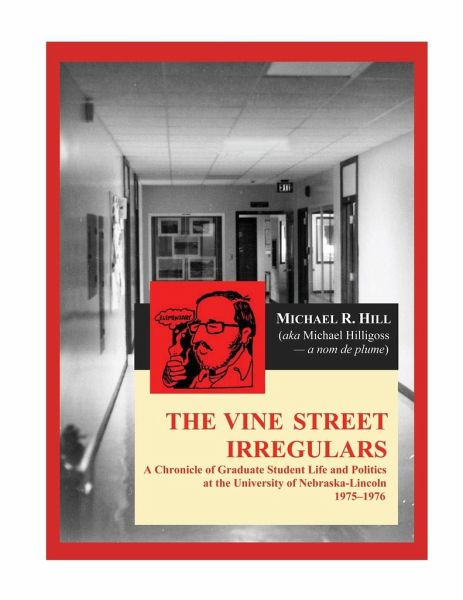
The Vine Street Irregulars
A Chronicle of Graduate Student Life and Politics at the University of Nebraska-Lincoln 1975-1976
Versandkostenfrei!
Versandfertig in 1-2 Wochen
19,99 €
inkl. MwSt.

PAYBACK Punkte
10 °P sammeln!
The memories recalled in the twenty-seven essays in the volume are anchored in sometimes intense and sometimes admittedly naive graduate student experiences at the University of Nebraska-Lincoln during the 1970's. Master's degree in hand, I returned to graduate study at Nebraska in 1972 after four years in the military, benefitting not only from the G.I. Bill, but also from a National Defense Education Act Fellowship. I was increasingly wise to the ways of administrative bureaucrats who were sometimes enlightened, sometimes punitive, draconian, and exploitive, or - far more often - simply mori...
The memories recalled in the twenty-seven essays in the volume are anchored in sometimes intense and sometimes admittedly naive graduate student experiences at the University of Nebraska-Lincoln during the 1970's. Master's degree in hand, I returned to graduate study at Nebraska in 1972 after four years in the military, benefitting not only from the G.I. Bill, but also from a National Defense Education Act Fellowship. I was increasingly wise to the ways of administrative bureaucrats who were sometimes enlightened, sometimes punitive, draconian, and exploitive, or - far more often - simply moribund. As adult students, we wanted fair play and respect. I pursued those goals at Nebraska as: (a) the Geography Department representative to the University Graduate Student Association, (b) as an early vicepresident of the Graduate Student Association, (c) as UNL's graduate student voting member on the three-campus System Graduate Council, (d) as a voting member on two Vice-Chancellor Search Committees, and finally (e) as the UNL Graduate Student Representative investigating and voting on a fellow graduate student's formal (and contentious) grade appeal. In these various roles, many students told me stories that made my toes curl. The cumulative result was a hands-on tutorial in bureaucratic/administrative machinations as they ground onward day after day on the Nebraska campuses. Subsequently, writing the essays that became The Vine Street Irregulars gave me a way to explore, in public, the issues, problems, and experiences that bedeviled the lives of far too many graduate students on the University of Nebraska campus during the mid 1970s. Now, nearly fifty years later, this volume preserves some of those struggles and hopefully captures parts of the socio-spatial milieu in which they unfolded. Minor errors and a few awkward phrases have been silently repaired. Where potentially useful, explanatory footnotes are appended.














